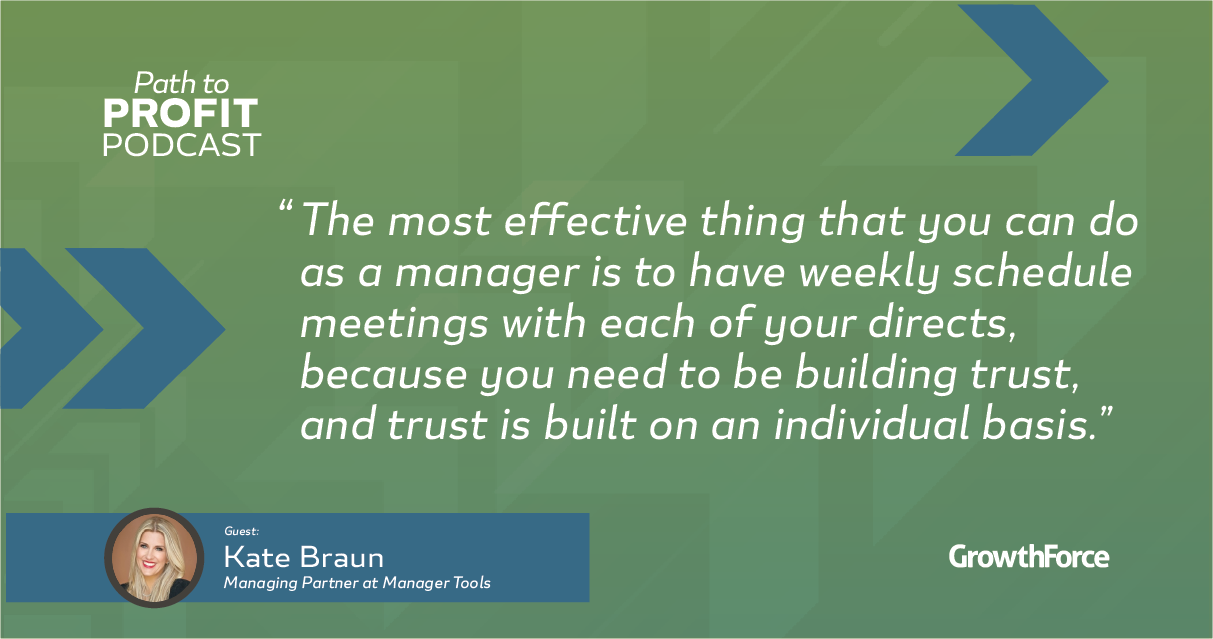8 min read

How does one go from being an employee to becoming a supervisor? How does a marketing expert, engineer, or craftsman start hiring employees and then transform themselves into managers of their own businesses? How do people already working in leadership roles become more effective managers?
|
Key Takeaways
|
These are the questions and challenges that Kate Braun, Managing Partner at Manager Tools, answers and helps her clients overcome every day.
She joined GrowthForce Founder and CEO, Stephen King on our podcast, Path to Profit, to discuss the tools she uses to help business leaders become better, more effective managers.
🎧 Listen to the full episode (& more) here! Lessons learned from growth-driven business leaders…
Management vs. Leadership – What's the Difference?
The difference between management and leadership, according to Braun, is that leadership is more of an abstract idea.
"It's almost theoretical in that there's not a lot of understanding on how to execute on leadership," she said. "What do you do? Like, if it's Wednesday morning and you have your coffee, and you're in the office, what is it that you do that says, 'Oh, this person's a good leader'? It's ephemeral to me."
Leadership, for Braun, is an ideal that lacks concrete, measurable actions that can be implemented to improve it.
On the other hand, she sees management as more of a science. According to Braun's definition, management encompasses a set of specific behaviors that can be learned, practiced, and improved upon to help a team become more effective and productive in an organization.
In this sense, leadership can't be taught but management can.
Defining a Successful Manager – The Metric for Measuring Management Success
But how does one go about defining what success means for a manager? Can management success be found in happier employees? More fulfilled employees? Perhaps, but these qualities – happiness and fulfillment – aren't necessarily the easiest to measure. They're subjective and have slightly different definitions that vary depending on whom you ask.
For Braun, management success boils down to two metrics that are actually different sides of the same coin: employee attrition and employee retention. Lower employee attrition and greater employee retention mark management success.
Read More: Invest In Your Middle Managers: They Can Make or Break Your Business
After all, as the saying goes, "People don't quit jobs; they quit managers."
In terms of management success, "retention" refers to positive internal retention for the whole organization – not just departmentally.
"The goal," she says, "is to keep people in the organization. So, if you have a team of five and one of your people [whom] you've helped, you've developed, [transitioned] or [got promoted] to be your peer, that counts. That's positive internal retention."
The 4 Science-Backed Actions You Should Implement to Become a Better Manager
Braun says there are 15 science-backed behaviors that help create more successful managers by improving retention. However, she recognizes that most managers don't have the time to add 15 more jobs to their workday. So, instead of implementing all 15, she recommends focusing on the four actions that together account for 75% of a manager's total ability to influence retention results.
These four actions include:
- Getting to Know Your People
- Performance Communication
- Asking for Growth
- Pushing Work Down
So, how do you actually go about implementing these actions and why are they so effective at improving management skills?
How to Implement These Actions for Better Management in Your Business
1. Getting to Know Your People = One-on-One Meetings
Braun says, "The most important thing, the most effective thing that you can do as a manager is to have weekly scheduled meetings with each of your directs because you need to be building trust, and trust is built on an individual basis."
People stay in jobs for the people. Especially in today's modern world, employees have opportunities to live anywhere and do the same job for the same pay from a different company. They don't care as much about the company they are working for as they care about whom they are working for. So, building strong relationships with your people is vital to employee retention.
Read More: How to Get a Better ROI From Your Meetings
In addition to being useful tools for getting to know employees and helping to build trust with them, she explains that these meetings should be structured. She recommends dedicating 30 minutes (one hour for higher-ranking employees) to each employee each week. These 30-minute meetings should be divided into three 10-minute segments: 10 minutes for the employee to speak, 10 minutes for the manager to speak, and 10 minutes for the future. The future talk should focus on things like the employee's goals, where they want to be in five years, and task delegation for the next week.
Weekly one-on-one meetings with directs have practical benefits, but also as Braun points out, "It's a kindness to spend time, focus on, and pay attention to the people who work with and for us."

2. Performance Communication = Providing Performance Feedback
Regular feedback is also essential to improving your management style, and Braun emphasizes the importance of regularly (even on a daily basis) giving positive feedback to employees. For example, if you have one employee who opens the office in the morning, thank them for getting up earlier than everyone else and being so reliable. Even though this is part of their job and it's something they're expected to do, they should hear that they're doing a good job at it from you.
The more positive feedback you offer employees, the softer constructive criticism and feedback about performance issues will land. If employees never hear from you about all of the things that they're doing right on a consistent basis, feedback about performance issues becomes inflated from the employee's perspective. Employees who receive one piece of negative feedback about a problem will think that the manager sees them as a problem.
Braun really stresses the importance of routinely offering positive feedback, instead of simply sandwiching one criticism between two compliments. As she puts it, "If you tell them every day what they've done well, and they know that they're doing well because you tell them all the time, and your feedback reflects the fact that 90% of their work is great, then when you have to say, 'Hey, here's a place where you have room for improvement,' it's a lot easier, and it's less fearful."
If managers do this, they no longer have to fear giving negative feedback because it won't be inflated to the point that the employee feels like they're mostly doing their job wrong. It won't be inflated to the point that the employee considers quitting as a result.
People leaders - this one is for you.
What Makes a successful manager? Listen to the full episode here!
3. Asking for Growth = Coaching
Coaching has a lot of synonyms in the business world. For example, it can mean performance reviews or actual training, and Braun recognizes the importance of defining what her form of coaching means for managers. In terms of improving retention, coaching is an upskilling process. In her definition, coaching is a process in which managers oversee the growth of their directs; they do not necessarily facilitate it.
"Basically, you set a goal, you brainstorm some resources, and that's crucial," she says. "The manager doesn't always have to be the learning resource."
Braun accepts that most managers don't actually have time to be the learning resources, but they can help their employees determine what skills they need to learn. They can help provide a budget to obtain the tools, training, and time that are necessary for learning new skills. Managers can set deliverables and expectations. The manager's role in coaching is to provide support and help facilitate the employee's development. Coaching should be purely about helping to support and guide learning and growth.
4. Pushing Work Down = Delegating
By pushing work down or delegating, managers help to elevate the tasks of the employees working beneath them. This, in a nod to coaching, helps employees learn how to be professionals. It provides real-world opportunities for them to develop new skills. Good tasks to delegate are things that you know how to do (so you can answer questions) and things that are outside of your primary responsibility (so you're not giving your responsibilities away).
Common tasks for delegation include:
- Creating meeting agendas
- Scheduling meetings
- Facilitating meetings
- Creating and presenting presentations
- Reports and reporting
- Project management and workflow facilitation
If you're a manager who has a difficult time delegating tasks, consider all the potential benefits that you stand to gain as a result of delegation:
- Time to focus on higher-level tasks
- Employee learning and improvement
- Elevated employee tasks (increased job fulfillment)
- Lower labor costs
- Reductions in siloed information
By delegating, you demonstrate trust in your employees, you coach, and you give your people the opportunity to become professionals – all to the benefit of your business.
Why Good Management Matters
Management is vital in running every business. Good management not only improves retention rates and lowers attrition but also creates better workplace culture while increasing productivity. Good management helps businesses and nonprofit organizations, alike, achieve their missions more efficiently and effectively.
If you're interested in learning more about how you can improve your own management style and that of other managers working in your business, listen to the full conversation on GrowthForce's Path to Profit.



![How People Drive Profit [GUIDE] 6 Key Company and People KPIs you need to make Data-Driven Decisions...](https://no-cache.hubspot.com/cta/default/549461/a4c91ab8-e371-4c8a-b4dd-8bd96d5105f0.png)
